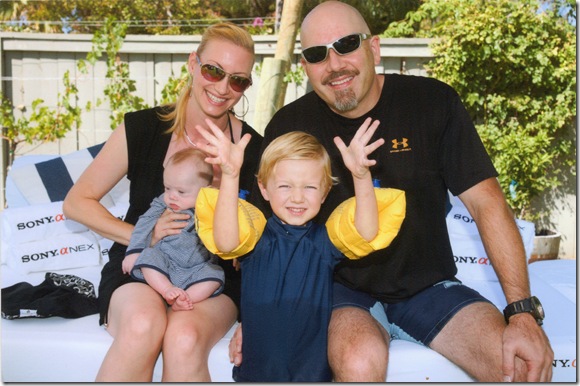Today’s post is by Jennifer, who wants you to know about having a child with Down syndrome:
What I want you to know is that when I was 20 weeks pregnant with my second child, I got a phone call that changed my life for good. This phone call delivered the news from my amniocentesis test, that revealed that my baby boy has Down syndrome. I will admit that my first reaction was one of utter devastation. I had outdated ideas of what Down syndrome meant and God forbid, you actually Google it- a laundry list of medical and neurological issues come up. For me, there was no question of whether or not to keep my baby- I was already feeling his strong little kicks and bonding with him. Since he was my second child, I was dreaming about the attachments I knew I would have with him, but I was terrified. Terrified that our life would never be the same. I quickly started trying to adjust to the news, backed away from the research; Googling, and got in touch with real-life families who have a child with Down syndrome. The outcome these families shared was far from devastating.
By the time I delivered our son, Elijah, we were excited to bring him into our family. He is now almost 5 months old, is rolling over, playing with toys, smiling, laughing and brings so much joy to our family. When I first got the news, everyone had the same reaction- to say, “I’m SO sorry!” At the time, I thought, it’s okay that everyone says I’m sorry, because it’s not at all what you expect. But, now I know that what we feared most are the outdated, preconceived notions of Down syndrome…and I wholeheartedly believe that these outdated preconceptions lead to the devastating fact that 92% of the women who get a prenatal diagnosis, decide to terminate the pregnancy! That’s right- I am one in 8% of women who keep their babies after a prenatal diagnosis. Those percentages hurt me to my core now that our baby Elijah is here. Because he is healthy, he is beautiful, and in my eyes, he is Perfect. It hurts that 92% of the people in my position would say that my son isn’t valuable enough to have a life.
I want people to know that Down syndrome isn’t nearly as isolating, scary and devastating as it’s been painted to be in the past. ….And that I am am not old, or decrepit, or fuddy duddy…(although since I just said “fuddy duddy”, I might be quickly brushed into that category!! ) 🙂 I want people to know that words DO have power…and where I once thought, A rose is a rose by any other name, I know now that words hurt and it is important to choose words that honor all people with respect and dignity. Some examples:
A Down(s) – A person with Down syndrome is not the disability. There are many other things that should, and do, define a person. It is dehumanizing and strips people of dignity when they are referred to as their disability. Instead of saying “He is a Down’s baby” or “She is Downs”, try “He or she Has Down syndrome.”
Down syndrome child/baby – This goes back to referring to the person first, not the disability. This is one of the most common misstatements made and often causes parents to cringe, at least inwardly. (This is where I interject an enthusiastic “True!”) For example, we don’t say “a diabetes child,” or “an asthma person”, so eliminating this reference is critical.
Normal Kids – Please realize that we perceive our children as being pretty normal kids. Comparing them to normal children implies that a child with Down syndrome is something less than normal. Try using, “Typically developing” or “non-disabled child”.
“They” as in “they are so loving: they are always happy” – Don’t generalize about people with Down syndrome. “They” are not all alike. Much like non-disabled children, kids with Down syndrome have a full range of emotions and will mature and grow into adulthood.
“How mild/severe is it?” – A person either has Down syndrome or they do not. Down syndrome is not an illness. Having Down syndrome does not mean a person is sick.
Suffers from/Afflicted with Down syndrome – Our children are not suffering or afflicted. We must instill a great sense of pride and self-esteem in all children, so our language must show that Down syndrome is not harmful or terrible, or anything to be ashamed of.

Me, Jennifer, my husband, Charles, my 3 year old, Christian, and our baby boy (with Ds) Elijah.
Jennifer Currier
www.MeAndMyBoysBlog.blogspot.com
